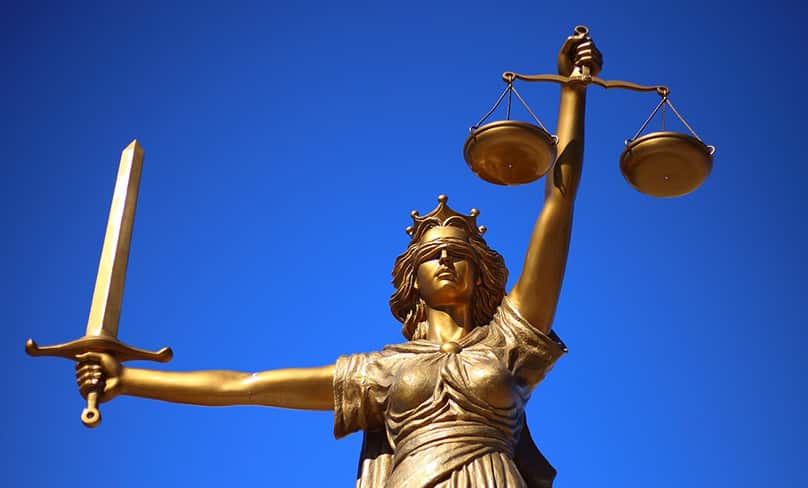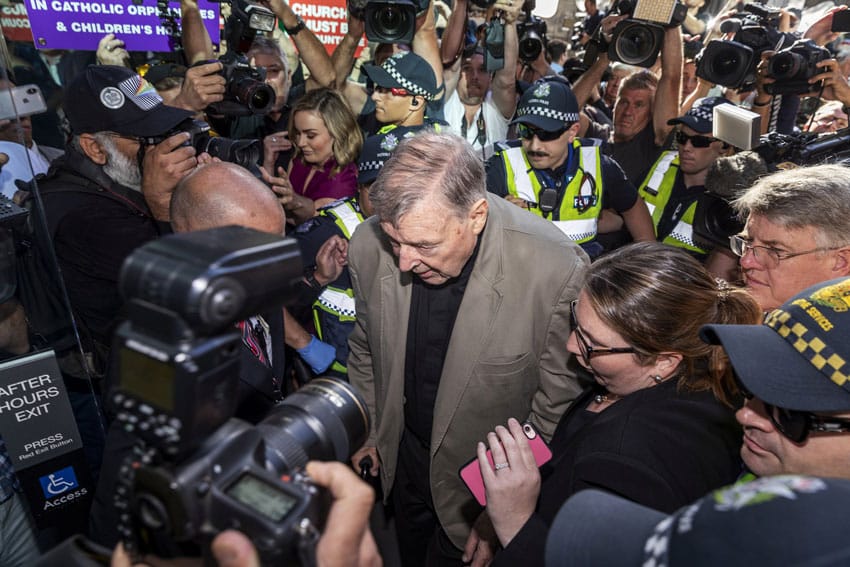
Speaking as an Australian lawyer, I know we have few appealing qualities. But we do believe in our own justice system.
All my life, I have joined in the chorus that our justice system is the best in the world. With the case of Cardinal Pell, I am not singing quite so loud.
It is not whether you like or loathe Pell, or even whether you think he is innocent or guilty.
What matters is whether we have a system of justice that is exposed to extraneous pressure whenever some media outlet or social media alliance decides that someone is or is not innocent.
Realistically, what the last year has shown is that the justice system can be systematically assaulted from the outside in a conscious attempt to make a fair trial impossible. This should terrify every citizen, because every citizen is a potential defendant.
The problem is, the wider justice system has two parts. The first, very formal and familiar, is the judiciary, the jury and the lawyers who actually work to produce a fair verdict. Thank God, in this country, directly nobbling any of these functionaries is virtually impossible.
But this formal structure is surrounded by a second ring, not involved in securing a verdict, but ensuring the conditions for reaching a fair verdict do exist.
See related article: Monica Doumit: We need saints to rise up
This is where you find rules about fair reporting of cases, not naming persons before they have been formally accused, honouring suppression orders and so forth.
The main institutions involved here are the media and the police. The media must report cases fairly, abide by the letter and spirit of the law, and not barrack for either side.
The police present evidence impartially, working for justice, not conviction. Media and police never combine to form a pro-conviction cheer squad.
This is where the Pell case has gone terribly wrong. Impartial judge and jury accepted, parts of the media – notably the ABC and former Fairfax journalists – have spent years attempting to ensure George Pell is the most odious figure in Australia. They wanted him in the dock as an ogre, not a defendant.
Worse, elements of the Victorian Police – notably including Chief Commissioner Graham Ashton – cooperated in the exercise.
Ashton’s repeated breathless announcements of impending charges and references to “victims” rather than “alleged victims” were matched only by the remarkable coincidences in timing between police pronouncements and favoured media exclusives.

The result was that when the trial judge imposed a blanket media order against reporting the trials themselves, it was like a ban on reporting that Vladimir Putin is a rather nasty chap.
The damage had already been done in a conscious, timely and thorough way. Even this was not enough for two Australian newspapers.
They ran massive stories that reporting of a vital court case had been banned, in an attempt to force the lifting of the suppression order.
They failed, but certainly demonstrated total contempt towards notions of a fair trial and judicial independence.
Though in a bizarre way, their self-righteous opportunism could be understood. Victorian suppression orders being what they are – Victorian – the case was indeed being reported increasingly freely overseas. Worse, foreign reports were all over social media, freely available in Australia.
In short, the trial was being “protected” less by a suppression than by a diversion order.
But without doubt, the most blatant undermining of the court’s attempts for due process was ABC journalist Louise Milligan’s book, Cardinal: The Rise and Fall of George Pell.
This hopelessly biased, ill-written, ungrammatical and poorly proof-read volume was rushed into publication last May by Melbourne University Press, apparently to get it on the streets before any trial and suppression order could commence.
Of course, when the suppression order was made, MUP withdrew the book from sale in Victoria. But it remained freely available in other States, and for purchase on the internet.
See related article: Fr Frank Brennan SJ: The Pell Verdict
So what we have witnessed is a combined effort by much of the media, including Australia’s public broadcaster, and elements of Victoria’s law enforcement agency, to systematically blacken the name of someone before he went to trial.
And remember, Victoria’s prosecutorial authorities never determined to proceed. They returned the police brief three times, before the police forced the case to go forward themselves.
This reputational blackening works in two ways. First, at the most human level, is there any Australian who does not now associate the word “Pell” with “child abuse”?
Second, is there any public official in Australia who does not understand that any action, no matter how appropriate, that might tend towards Pell’s acquittal, will meet swift, public retribution?
This is not a story about whether a jury got it right or wrong, or ultimately about whether justice is seen to prevail.
It is a story about whether a jury was ever given a fair chance to make a decision, and whether our justice system can be heard above a media mob.
